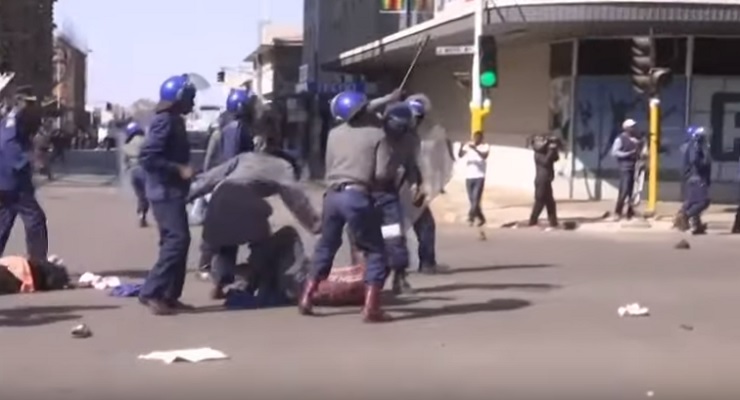
The opposition Movement for Democratic Change (MDC) defied a government ban and went ahead with the planned 16 August 2019 Zimbabwe protests. The protests were meant to express disapproval of a worsening economy and the electricity crisis. Blackouts can last for close to 18 hours a day and prices have been increasing almost steadily in Zimbabwe in the past several months. According to UN reports and the World Food Programme (WFP), close to 5 million inhabitants in Zimbabwe are in need of assistance and at least half of them may face starvation.
Government’s response to the protests was heavy-handed
The Zimbabwean government deployed riot police in response to the protests. Protesters were teargassed and fired at. The police took the lead with batons and moved to clear the streets, beating protesters, with some sustaining injuries and others loaded unto armored vehicles. That not being enough, checkpoints were setup to stop MDC supporters from reaching the capital. Travelers then had to stay in traffic for long hours as the Police searched cars, buses and pedestrians for weapons. Cars leading to MDC party headquarters were asked to go back.

According to Mike Nyashanu, “people were peaceful and marched with order. They know that we always sing during demonstrations. Why are they beating us? Is this the democracy that they always talk about? They are the ones who are violent.”
Though the government had stopped the protest by a court order on Thursday, the MDC declared the protest will go on as planned despite the court’s decision. “The government has come out in full force. The legal decision [upholding the ban] is unconstitutional … [Chamisa] is concerned about loss of life but he believes the country will have to move forward”, said Dr Nkululeko Sibanda.
Changing the guard
President Mnangagwa took over from long-time ruler Robert Mugabe by means of coup. He won the July 2018 election and promised to return Zimbabwe’s economy to progress. But things have grown from bad to worse as the Zimbabwean people have instead been facing growing hardship.
“There is no difference between Mnangagwa and Mugabe. We jumped from the frying pan into the fire after the November coup”, MDC deputy leader, Tendai Biti, told reporters outside the court. He went on to say that “the constitution [of Zimbabwe] guarantees the right to demonstration… yet [the fascist regime of Mnangagwa] has denied and proscribed this right to the people of Zimbabwe.”
Mnangagwa’s government has preached peace but much like his predecessor has deployed violence. According to the Zimbabwe Human Rights NGO Forum, a coalition of 21 human rights groups, “at least six opposition and rights activists were abducted and tortured by unidentified assailants in the days leading up to the protest.”
Deep political and economic reforms as the only way forward to avert full scale violence in Zimbabwe
The U.S. Embassy in Harare considers political and economic reforms to be the only way in which Zimbabwe’s problems can be solved and cautions protesters to be peaceful. However, several Zimbabweans who are more and more disillusioned with the ruling Zimbabwe African National Union – Patriotic Front (ZANU-PF) are beginning to say that peaceful demonstrations have produced little or no tangible result. Protests affected the education sector in 2007 and lawyers went to the streets in March 2019 with almost no major adjustments despite loss of life from repression.
The approach of stifling dissent poses a great threat to Zimbabwe’s democracy, peace and stability and violent repression during the 16 August 2019 Zimbabwe protests is only placing the Southern African nation more on the path of instability. If the economic situation in the country does not get better, more protests may be organised and if repression persists, dissent may turn into full scale conflict in Zimbabwe.
To avert another catastrophe in Africa, it is important for the ZANU-PF to desist from repression, open a forum for national dialogue, consider a government of national union and make credible reforms in electoral administration and civil-military relations.
Leave a Reply